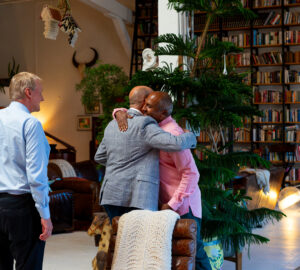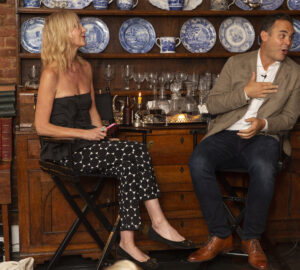“Absolutely savage” and “far too real” were not at all the words I expected would describe author Jesse Browner’s theory of hosting psychology after picking up his book, The Duchess Who Wouldn’t Sit Down: An Informal History of Hospitality. Much to my shock and delight, after writing for The Salon Host for several months leading up to the site’s launch, it felt like someone finally blew the lid off what’s really going on here.
“Hospitality, we’ll see, is rarely about giving the guest what they need; it is all about, and always has been about, giving the host what they need,” Browner espouses, and by the way, this is only seven pages deep! In his own words, the whole point of exploring the idea to begin with is to “lay bare the moral dilemma” of hosting, to examine what goes on at the subconscious level. Laid bare indeed, the first chapter practically gave me an existential crisis.
But zooming out, it’s all so gloriously obvious – as was well established by the Bloodhound Gang at the twilight of the 20th century, we’re nothing but mammals, so of course we must still be subconsciously adhering to natural laws. In the most primal sense, we need food and community to survive, so we’re naturally attracted to and grateful for those who provide it. According to the book, during his long-running poker game, he learned that the more decadent the pulled pork sandwiches he prepared for his guests were, the more he seemed to win.

He now admits that his sandwiches may not have been that powerful (although the game is 3o years running and he’s still winning, and he’s still the only one cooking), but the scenario is still a microcosm of the aforementioned moral dilemma of hosting. “People want to project an image of themselves and projecting that image onto a group of their peers or those they perhaps perceive as being of a higher or lower social status, is a very important part of how we design and conceive of our hospitality whether or not we’re aware of it. We all live in groups that affirm our identity of ourselves, and our friends do that for us, not in any cynical way but we absolutely see ourselves in the eyes of our friends. But the host is getting every bit as much as we’re getting back from our guests if not more.” Absolutely savage, albeit largely unconscious, but a fascinating take nevertheless.
The book also speaks to the inherent social anxiety of being a guest in anyone’s home, even if they’re your best friends, but particularly amongst a crowd of strangers. “You’re anxious to express yourself correctly, especially after Covid, people are choosing their words more carefully. When we walk into someone else’s home as guest, even if they’re friends, we want others to see us the way we hope we are at our very best,” he says. “We’re so curated now, we don’t put the bad stuff on display, and we’re not aware of it, but whether we’re with strangers or close friends we’re mediating the image we’re projecting of ourselves. I think we hold a lot back to try to put our best foot forward, and that’s increased 1000 fold if we’re among strangers.”
Despite his own projected moral quandry around hosting, Jesse does believe there is a tremendous responsibility that falls on the host to help assuage the inherent anxiety (which at one point in the book he attributes to an ancient, deeply primal and very valid fear dinner guests once had that their hosts might eat them). Beyond assuaging social anxiety, hosting done well should also invite out the authentic, curious nature of the guests by meeting all their needs, and hopefully everyone becomes so relaxed and satiated that the thought of potential cannibalism never crosses their minds. One can only hope!
Jesse further describes the art of hospitality as “creating your own universe,” and insists that salons in the truest sense of the word must be curated by a single person to be the authentic salon experience; one chemist who understands every how every element combines to create true social alchemy. “Salons have always been associated with the rise of bourgeouis intellectualism, the idea of a salon means to have a host, a single person curating the attendees. It’s not really a salon unless the people there have all been brought there by one person for specific reasons.” I feel like there’s really something to this idea of singular curation that may also inherently relax the guests, because they know they’ve been invited for a reason and thus feel a sense of belonging walking in the door.
As always, here at The Salon Host we’re eternally inviting you to create your own universe, your own brand of social alchemy and become the linchpin of your community IRL. So what are you waiting for?! Scroll to the bottom of this page for Salon Hosting 101.



